
The Booth community remembers Øystein as a diligent and passionate scholar, a terrific colleague, and most importantly, a good friend.
- By
- July 24, 2020
- James M. Kilts Center for Marketing

Øystein Daljord, 41 years old, passed away unexpectedly on Saturday, June 13, 2020, in Chicago, Illinois. He received his PhD from the Stanford Graduate School of Business in 2015 and worked as an assistant professor of marketing at the University of Chicago Booth School of Business from 2015 to 2020.
Øystein dedicated his academic career to research at the intersection of economics and marketing. His passing came at a pivotal moment in his career, with a pipeline of research papers on the verge of completion and almost ready for submission to peer-reviewed journals.
"Most importantly, Øystein was a good friend," writes Jean-Pierre Dubé, the Sigmund E. Edelstone Professor of Marketing and Director of the Kilts Center for Marketing. "Personally, I will miss our evening rituals comprising outstanding food and stellar wines to complement the continuation of an intellectual debate from the office. Øystein will be missed sorely and his passing was a tremendous loss to the academic community."
Øystein Daljord, 41 years old, passed away unexpectedly on Saturday, June 13th 2020 in Chicago, IL. He received his Ph.D. from the Stanford Graduate School of Business in 2015 and worked as an Assistant Professor of Marketing at the University of Chicago Booth School of Business from 2015 to 2020.
Øystein dedicated his academic career to research at the intersection of economics and marketing. He developed original theoretical results and methods in the domain of econometrics that can be applied to consumer problems in marketing. Substantively, he was interested in forward-looking consumer behavior and whether consumers consider the long-term implications of their current purchase decisions. The lower weight a consumer assigns to future benefits and costs associated with making a choice today is termed discounting and much of Øystein’s research focused on the feasibility of measuring consumer discounting using transaction data.
In research with Jaap Abbring of Tilburg University, Øystein developed new theoretical econometric findings to measure discounting, in the process challenging established conventional wisdom that deemed such work to be infeasible with standard datasets tracking consumer choices. In a series of follow-up papers, Øystein and his various co-authors extended these methods and applied them to several marketing problems including the study of consumer brand loyalty, rewards programs, mortgage default and pricing over time.
Øystein was a diligent and passionate scholar, making him a terrific colleague. He read others’ research deeply and with a very critical eye. He thrived on academic debate and the pursuit of a deep understanding of both his own and his peers’ scientific ideas.
This monograph summarizes Øystein’s academic scholarship and collegiality. As the summaries attest, Øystein passed at a pivotal moment in his career, with a tremendous pipeline of papers on the verge of completion and ready for submission to peer-reviewed journals.
Most importantly, Øystein was a good friend. Personally, I will miss our evening rituals comprising outstanding food and stellar wines to complement the continuation of an intellectual debate from the office. Øystein will be missed sorely and his passing was a tremendous loss to the academic community.
Edited by Jean-Pierre Dubé
Sigmund E. Edelstone Professor of Markeing and Director of the Kilts Center for Marketing
University of Chicago Booth School of Business and NBER
|
Dan Bartels |
Øystein was a highly valued friend and colleague who will be sorely missed. He and I didn’t do the same kind of research, but that didn’t stop us from stopping by each other’s offices on almost every day and discussing research ideas. Usually, we’d drop in to briefly catch up personally, but in most cases, we ended up in a longer discussion than we planned on, usually because one of us would bring up some research-related item, and a long discussion of related ideas would ensue. I will also miss his sense of humor, which punctuated these nerdy discussions with bursts of laughter. In addition to our time together in the office, Øystein and I spent a lot of time together over dinner or drinks or at each other’s houses, as we lived nearby each other. He and I ended up teaching during the same slot in night classes in downtown Chicago (by accident), and we went out for a late dinner after teaching on several occasions, which was a nice way to end a long day of teaching. |
Sometimes, I’d bring my kids over to his house, and/or he’d visit with my kids here at my house, like he did (at a safe social distance), just over a week before the last medical incident. Øystein and my oldest daughter, Elsie, now five years old, had a special relationship. They bonded over their mutual admiration of David Bowie. Elsie has a handful of charmingly strange gifts to remember Øystein by. He and I were close, and over the course of our friendship, we discussed virtually everything, from how models in physics inform the social sciences, to personal relationships, to music and movies, even spirituality.
He was an endlessly questioning colleague with a constant craving for intellectual stimulation who always kept us on our toes. He was also a warm and compassionate friend and confidant to those of us who got close to him. He was also one of the most generous people I’ve known. He was a great colleague and friend to me, and he is sorely missed.
|
Magne Mogstad |
I was saddened to hear about Øystein’s passing. He was a good friend, colleague, and person. I think of him often. Øystein and I had a lot in common. We were about the same age and grew up in the same part of Oslo, Norway. At that time, I did not know him, but I knew of him. Back then, we only had one TV channel in Norway. And Øystein was an actor in the most popular TV show for teenagers, Borgen skole. That made him a local celebrity. |
Both Øystein and I did our undergraduate studies in economics at the University of Oslo. Same class. Same study group. We quickly got along. Already as a student, Øystein stood out as extremely curious, intellectual honest, and rigorous. He was also fun and social. The time as a student was a high point in my life, and I believe in Øystein’s as well. I remember the exhilarating sense that we were learning something useful and interesting. Unlike most people, Øystein never lost the joy and excitement of discovering and learning.
We both got our first real job in Norway. Him at the national competition agency and me at the national statistical agency. However, we were both restless, knowing there was something more we wanted to do with our careers and lives. He moved to Stanford and I started a job in London. Living in different cities, we lost touch.
Our paths crossed again when Øystein joined the University of Chicago in 2015. We immediately started to hang out again. Discussing work and life. Over dinner, drinks or a walk. Time spent with Øystein was never boring. He had an expansive curiosity and enthusiasm, he was generous and warm, and he had a good sense of humor.
Øystein’s training as an academic economist was primarily in industrial organization, but his interests were much broader. His research was deeply rooted in the intersection of economic theory and empirical microeconomics. Theory was held up to the scrutiny of data, and empirical analysis was informed by economic theory. His papers were refreshingly clear. Not only about the economic questions that he addressed, but also about the data and methods used to justify his findings.
A good example is Øystein’s recent work with his coauthor and good friend Jaap Abbring. The starting point is the long-standing question about how to learn about the discount rate – the rate at which individuals discount future costs and benefits. This parameter is critical to understand and predict choice behavior in a wide range of settings. Øystein and Jaap provide a simple and intuitively appealing analysis of how one may recover the discount factor in economic models where an agent chooses over discrete options that have future implications.
Not long ago, this paper got accepted for publication. I remember how excited that Øystein was. Not so much about the publication per se, but about all the exciting work to come, in the future. Shortly after, Øystein sadly passed away. He was a great colleague and friend, and he is sorely missed.
|
Veronika Rockova |
Øystein was a truly unique intellectual who was not only a talented colleague but, most importantly, a trusted friend. Øystein was among the first faculty with whom I interacted at Booth when I started out as an assistant professor in 2016. One day, he just showed up at my office, which was close to his, with a curious inquiry about identification in structural models. Although my answer was not particularly coherent (not so surprising since Øystein asked those challenging questions), reaching out to me was such a nice collegial gesture. It marked the beginning of our friendship. My interactions with Øystein grew when we discovered we had the same tennis instructor at the Quadrangle Club. We soon realized it would more “economical” if we played against each other instead of paying for tennis lessons. |
This turned out to be the beginning of a weekly tennis routine which lasted for almost a year (even after his first stroke). At first, I was the better player. However, Øystein's athleticism, perseverance and voracious style inevitably led to his surpassing me. I thoroughly enjoyed our afternoon games which were often followed by conversations about navigating the challenges of academic life. Øystein fostered genuine interactions with people and embraced their idiosyncrasies. He was a free and authentic thinker who resisted mediocrity. He enjoyed honest and rigorous intellectual disputes and pursued truth relentlessly, refusing ever to sacrifice his integrity.
Beyond the office, Øystein cultivated several “high-quality eccentricities,” as he liked to call them. He would say “It's an art many aspire to, but few master.” This included a unique appreciation of exotic perfumes, corduroy suits, exquisite wines and ... truffles. His taste in art was impeccable and nonconformist. His sense of humor was perhaps unconventional but sincere, contagious and unapologetic. He was a consumer and connoisseur of the finest things in life, in particular (classical) music. We argued about the best interpretation of Rachmaninoff's 3rd piano concerto, his favorite. Øystein liked Martha Argerich for her “assertiveness and jazziness” (his words) while I found her style too carnivorous and overpowering, just like Øystein's tennis game. No wonder he liked her so much. During the lock-down, we would often go for walks (social-distancing aware) and I became accustomed to interacting with him on a semi-regular basis. I will miss our intellectual discussions about music, European films, fashion and, of course, our tennis matches. Øystein had a “combined taste for sentimentality and cynicism” (his words) and a wonderful sense of aesthetics as seen from his nonchalantly elegant wardrobe and daring office furniture. He filled my workdays with joy whenever he showed up in my office to discuss research or to just say hi. He had a “jolly” (he loved that word) and entertaining personality, always so refreshing.
A private soul who cared very deeply, Øystein was one of my dearest colleagues at Booth. He will be thoroughly missed.
|
Christian B. Hansen Wallace W. Booth Professor of Econometrics and Statistics University of Chicago Booth School of Business |
Øystein is a colleague I really valued and will miss. I met Øystein when he approached me for comments on work he was doing that touched upon my research interests. This initial interaction then developed into my being a low-key outside senior colleague whom Øystein could use to get comments on his work and a bit of a mentoring in the publication process. As I read and commented on his papers and interacted with Øystein more generally, I enjoyed his intellectually honest, principled, and challenging approach to discussing research and ideas. He struck me as a thinker who was not interested in getting quick or flashy results but in fully understanding a topic and making deeper, lasting contributions. Over the last couple of years, Øystein and my relationship developed beyond my initial mentor role. He and I often talked about research, both his and mine, along with the occasional tangent about tennis, biking, or whatever else crossed our mind. |
I liked that he and I had similar goals in trying to understand what one could really learn from data coupled with models from human behavior. We enjoyed these interactions enough that we started a couple of projects together. We would sit in his or my office and bounce ideas around, try things out, and, as is often the case with research, not make any real progress. All the while, we’d be having an intellectually stimulating conversation, learn a few things, and have a good time. Unfortunately, nothing came to fruition, though I’d like to think we would have produced something given more time. I am very saddened by his loss but am glad I was able to have the interactions with him that I did. I am certainly the better for having crossed paths with Øystein.
Øystein Daljord, “Commitment, Vertical Restraints, and Dynamic Pricing of Durable Goods,” Unpublished manuscript.
In this paper Øystein investigates the economic implications of fixed market prices in the context of the Norwegian book industry. This industry has historically been regulated by the national price agreement that was enforced by the associations of publishers and booksellers. Under the agreement, publishers were allowed to fix the retail prices of the new book titles for a limited period of time, after which book stores were free to implement discounts and change the prices at their discretion. In 2005, the new competition act forced a weakening of this agreement: the restraint period was shortened and the price restraint itself was softened. Of interest is the effect this regulatory change had on the profitability of the Norwegian book industry.
Under the classic practice of price-skimming, a seller of a durable good, such as books, can earn higher profits by lowering its price gradually over time to price discriminate. However, if consumers are forward-looking and anticipate these future discounts, they may delay their purchases and unwind the firm’s benefit from skimming. Expectations of future discounts can even become self-fulfilling as shrinking current demand forces the seller to reduce its price in order to retain profits. In the limit, intertemporal substitution may force prices to unravel immediately to the costs of book production, and even a monopolist may fail to make any real economic profit. In this case, the firm may be more profitable if it can commit to limited future discounts to avoid competing against expectations of its own future prices. Therefore, an accurate understanding of the evolution of the book Norwegian book market requires a sophisticated mathematical model that allows for the interaction of consumer beliefs and bookseller pricing strategies over time.
Øystein starts with a model of the consumer decision process, and accurately matches this model to a dataset covering about 40% of all book sales in the country in the relevant time period. To determine the degree of consumer patience, he relies on the theoretical results in his joint work with Jaap Abbring (see below). Øystein then used the estimated demand model to numerically simulate several scenarios of dynamic interactions between publishers, booksellers and consumers under several possible regulatory regimes, both observed and counterfactual. His findings suggest that the Norwegian book market experienced a dramatic increase in profitability after the fixed pricing policy was relaxed. This result stems primarily from Øystein’s empirical finding of high consumer impatience. In addition to providing empirical insight into the Norwegian book market, the paper also provides a general-purpose framework for analyzing many other durable good markets with forward-looking consumers.
Submitted by Fedor Iskhakov
Abbring, Jaap H. and Øystein Daljord (2020), “Identifying the discount factor in dynamic discrete choice models", Quantitative Economics, 11(2), 471–501.
Abbring, Jaap H., Øystein Daljord, and Fedor Iskhakov (2020), “Identifying present-biased discount functions in dynamic discrete choice models”, Unpublished manuscript.
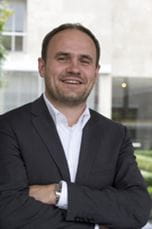
Jaap Abbring
Professor of Econometrics
Tilburg School of Economics & Management
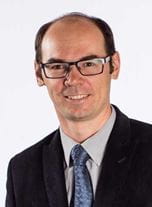
Fedor Iskhakov
Professor of Economics and ARC Future Fellow
Research School of Economics
Australian National University
Dynamic discrete choice models are widely used in economics and marketing to study the repeated choices that people and firms make to shape their future opportunities and outcomes. Examples include individual schooling and labor market choices, firms’ decisions to enter and exit markets, and households’ adoption of solar panels. A dynamic discrete choice model for such choices can be used to evaluate public policies that take aim at these choices. For example, a model of school choices can be used to predict the effects of changing tuition fees on schooling and a model of solar panel adoption can be applied to evaluate green energy subsidies. Of course, for this to work, we need to pick a model that accurately predicts behavior under the policies we wish to evaluate. To this end, we would typically collect data on choices that were made in similar situations and set the model’s unknown “parameters,” the quantities that describe the decision makers’ preferences (what they like), beliefs (what they think to know), and constraints (what they can do), to values such that the model best fits these choices. One complication when “estimating” the model this way is that the choice data may not provide enough information to fully determine (“identify”) all unknown model parameters. Specifically, observed choices provide surprisingly few clues about the decision makers’ “discount factors,” which are the parameters that determine how much they care about the future. At the same time, knowing these discount factors is key in many applications. For example, if households care little about the future, solar panel adoption may be best stimulated by directly subsidizing the current investment in solar panels; if they care a lot, it may be cheaper for the government to instead promise higher electricity rates for the electricity the households will produce in the future.
In Abbring and Daljord (2020), we study this problem for a standard model in which time preferences are captured by a single parameter, an “exponential” discount factor that captures how tomorrow is valued relative to today. A common intuition in applied work is that this discount factor can be identified and estimated if we have data on choices in two situations in which these choices’ current costs and benefits are the same, but their expected future consequences differ. For example, in their study of solar panel adoption in Flanders (American Economic Review, 2019), Olivier de Groote and Frank Verboven note that we may observe Flemish households across situations in which current solar panel investment costs and subsidies are the same, but promised future electricity rates differ. Intuitively, the more households’ adoption decisions differ between these situations, the more they care about the future. Surprisingly, even though this intuition is very common in applied work, it was never properly developed into methods to identify and estimate discount factors. In Abbring and Daljord (2020) we fill this void, by explicitly and intuitively relating the discount factor to the choice data, without the need to consider any of the other unknown parameters (which can be determined in a second stage if desired). Surprisingly, we find that there may be multiple, distinct discount factors that fit the observed choices equally well. However, in many applications, there will be enough information to estimate the discount factor. We provide a practical method for doing so.
In Abbring, Daljord, and Iskhakov (2020), we extend this analysis to an important, more complicated model, in which decision makers not only discount the future with an exponential factor, but may in addition suffer from “present bias.” A famous example of present bias arises in a fictitious but intuitive experiment in which you are asked either to choose between (A) one apple today and (B) two tomorrow, or to choose between (C) one apple one year from now and (D) two applies one day later. It is easy to imagine that you would prefer A over B, but D over C. Moreover, if you would have to choose between C and D one year from now, so once the choice is like that between A and B, you may instead prefer C over D. Such a “preference reversal” suggests that you are present biased: You are always particularly eager to eat an apple today. A more practical example may be exercising in a gym, which is a pain, but benefits your future health. Today, you may think that you should work out next week, but once next week has come, your present bias may well keep you out of the gym. If you are sophisticated enough, you will foresee that your future self will not exercise according to plan. Then, you may want to steer your future self in the right direction, of exercising, by making that cheap, for example by buying a gym pass now. More generally, present bias may keep you from investing enough in pensions, insurance, etcetera, and is therefore an important problem. Our understanding of how to measure it from choice data is however incomplete. In Abbring, Daljord, and Iskhakov (2020), we contribute to this understanding by extending Abbring and Daljord’s (2020) analysis to the model with present bias. This is nontrivial and, among other things, involves developing a new theoretical result for dynamic discrete choice models with present bias. We find that, in contrast to some earlier claims in the literature, choice data do not distinguish well between the exponential discount and present-bias parameters. We are working on an application that demonstrates what can and cannot be learned.
Submitted by Jaap Abbring
Øystein Daljord, Jean-Pierre Dubé and Xinyao Kong (2020), “Non-parametric Estimation of Brand Loyalty,” Unpublished manuscript.

Jean-Pierre H. Dubé
Sigmund E. Edelstone Professor of Marketing
University of Chicago Booth School of Business and NBER
By the mid 20th century, scholars recognized that marketing expenses related to brands and branding were on the same order as the costs of manufacturing and distributing consumer goods. This escalation naturally raised some important questions regarding the role of brands and whether marketing expenses represented valuable investments to firms. Testing for brand loyalty represents one of the earliest and most central themes in the academic literature in quantitative marketing. Of interest was whether switching a consumer to a given brand today would increase the chance of the consumer repeat-buying the same brand. Such brand loyalty would justify expenses on consumer acquisition, such as awareness advertising and temporary price discounts. Moreover, such brand loyalty could create barriers to protect branded incumbent firms from entry by competitors who would be disadvantaged by their lack of brand loyalty.
Numerous studies throughout the 1960s and 1970s[1] tested for brand loyalty by examining data tracking the sequences of consumers’ brand purchases in specific branded consumer product categories. The results were mostly inconclusive and at best mixed. Standard tests for loyalty lacked statistical power when applied to short (e.g., one-year) purchase panels. By the 1980s, the literature shifted towards stylized “random utility models” from economics. These approaches generated more conclusive findings on brand loyalty and its implications for marketing, but at the cost of requiring a lot of assumptions of mathematical convenience to make the methods tractable. Many of these assumptions were not only untestable, but were not derived from economic principles.

Xinyao Kong
Ph.D. Student
University of Chicago Booth School of Business
In Daljord et al (2020), we apply a new methodology proposed by Torgovitsky (2019) that reformulates the consumer’s brand choice problem in a non-parametric potential outcomes framework. The approach enables us to set-identify the key brand loyalty behavior using only assumptions motivated by economics, and not by mathematical convenience. We show that the approach nests some of the classic tests for brand loyalty while enabling us to obtain higher statistical power in our testing, both through efficient data-pooling and through the use of economic restrictions. Moreover, we are able to compute bounds on the size and extent of brand loyalty.
In addition to testing for loyalty, we also construct a test for forward-looking behavior to assess whether consumers consciously plan their brand loyalty, as opposed to unconsciously engaging in buying habits. Our analysis is still in progress. However, we have applied our approach to several consumer purchase databases. Our preliminary findings suggest that at least one third of consumers exhibit brand loyalty and that this may be a conscious decision reflecting rational, forward-looking behavior.
Submitted by Jean-Pierre H. Dubé
[1] See the excellent survey by Bass, F.M., M. M. Givon, M. U. Kalwani, D. Reibstein and G. P. Wright (1985), “An Investigation into the Order of the Brand Choice Process,” Marketing Science, 3(4), 267-287.
Øystein Daljord, Carl Mela, Jim Sprigg and Song Yao (2020), “The Design and Targeting of Reward Programs,” Unpublished manuscript.
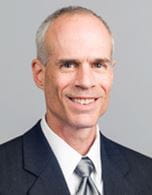
Carl Mela
T. Austin Finch Foundation Professor of Business Administration
Fuqua School of Business, Duke University
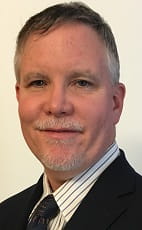
Jim Sprigg
Dir. Database Marketing
IHG

Song Yao
Associate Professor
Olin School of Business, Washington University
Together with Øystein, we have been developing a scalable approach to the design and targeting of purchase reward promotions. Such programs are growing at a compound annual growth rate of 23%, from a current level of $2.6 billion annually in 2018 to $9.2 billion in 2024. In spite of this growth, there has been relatively limited research on optimizing reward program design.
Our focus has been on reward programs characterized by two parameters: a purchase threshold (called a hurdle), above which customers receive an incentive (reward). For example, Starbuck's provides each customer with two stars for every dollar paid, and upon earning 50 stars the customer can receive a hot coffee or a bakery item.
Designing better reward programs is often problematic because rewards are often targeted to those who are most likely to buy. As a result, the apparent efficacy of a reward can appear greater than it would be if rewards were not targeted. This has led some firms to mistakenly assume their promotions were profitable. We solve this problem by using a field experiment conducted by IHG hotels to ensure promotions are not targeted at those most likely to stay. The average experimental increase in stays from these promotions is on the order of 20%.
However, the use of experiments leads to another problem. While one can compute revenues and profits for the specific set of rewards and hurdles used in the experiment, the most profitable reward structure might not be a level used in the experiment. It is too costly to experiment with every potential reward and hurdle (and there are not enough subjects to do so), so we are in the process of developing a means to extrapolate beyond the experimental cells in order to find the best (most profitable) reward design.
This extrapolation beyond cells problem involves three stages. In the first stage (called the propensity to be treated), one considers how a different promotion would affect the probability a customer reaches the award. For example, a higher reward means that a customer is more likely to attain the hurdle. Hence the term “extrapolation” as we are extrapolating away from the observed data from the experiment. In the second stage, one considers how many stays would happen if someone reached the reward (is treated) and how many stays would have occurred if the reward is not reached (the customer is not treated). In the third stage, one considers the profit implications. Those who meet the hurdle have more stays (which increases revenue), but also earn a reward (which increases costs). Our intent is to find the best combination of rewards and hurdles that yield the highest profits. Further, we seek to do this at the customer level, as different customers react differently to different incentives.
To address the first two stages, we use an approach that links the likelihood of meeting a hurdle to nights stayed. One key benefit of our approach is that we consider not only how observable differences across customers (like prior stays or loyalty status) affect the likelihood a reward is attained and the number stays, but also unobservable factors. For example, consider a person who switches companies. They might be less likely to attain the reward and also less likely to stay more nights if they do. A second and somewhat more esoteric key benefit is that the approach allows the forecasts for stays to be within a set of bounds instead of being exact. In other words, our forecasts can reflect “educated guesses” and show the bounds on those guesses.
In sum, we are developing a scalable, implementable approach to help companies design more profitable reward promotions.
Finally, a word more specifically about Øystein's role in the paper. The paper originally was focused on understanding how consumer's behavior changed as they approached their goals. For example, they might accelerate stays as they near the goals. We dropped that focus because Øystein showed us that existing approaches are already very flexible in capturing those behaviors, and that more complicated models added little insight and were hard to validate. We then focused on reward design, but used a complicated model that considered the dynamic choice problem of investing money now to obtain a reward later. Øystein showed us that these models were complicated, hard to scale (apply easily at a company), and somewhat unstable. Never before have I changed the research direction of a paper midstream twice. It was Øystein's drive to find highly credible findings that caused these pivots, and introduced me to a new way of looking at the problem. He had a beautiful mind, and while this paper will be far better as a result of him, it will never be what is could were he still with us. We will miss his company and his scholarship.
Submitted by Carl Mela
Øystein Daljord, Denis Nekipelov and Minjung Park (2019), “A Simple and Robust Estimator for Discount Factors in Optimal Stopping Dynamic Discrete Choice Models,” Unpublished Manuscript.
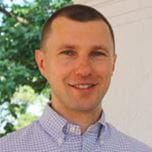
Dennis Nekipelov
Associate Professor
University of Virginia Economics Department

Minjung Park
Associate Professor
Ehwa Womens University
Our work with Øystein began when he communicated with me regarding my forthcoming, co-authored paper that was coming out at Quantitative Marketing and Economics . He gave some very insightful comments on that paper and it became clear that we needed to collaborate to work out the issues that he brought up.
The paper is about designing a very simple method for the estimation of time preferences in a dynamic setting with a fixed ending time. Time preference, measured by an individual’s “discount factor,” measures how much today’s unit of consumption will be valued tomorrow and it is an indicator of the degree of impatience for an individual. The idea of the paper comes from a simple but very powerful observation: if we work with the optimal stopping problem, where an individual in each period can either stop the process forever or continue, the total value of continuation monotonically changes over time.
A simple example of this environment is the mortgage default decision: an individual’s mortgage matures at a certain moment in the future and in each period prior to maturity, an individual can choose between defaulting on the mortgage and losing the house versus making a payment and enjoying the house for another period. In this decision problem, the value of making a payment increases as the individual gets closer to the final period when the mortgage matures. The individual should prefer not to default on a mortgage when it is about to be paid off.
We used this observation to devise a simple approach to estimate the time preference from the payment data. Logically, we do not observe a given individual simultaneously defaulting on a payment and making a payment in the same period. But, we do observe cohorts of individuals in different “stages” of their mortgages based on how close they are to maturity. We show that the time preference can be measured by observing the difference between the default probabilities for any two such cohorts of individuals: it is inferred by observing how the average probability of default changes as cohorts get closer to the period of maturity. Based on this idea, the discount factor can be estimated using very simple linear models, thereby making the measurement of individual time preference accessible and attractive to a broad range of researchers without the need for complicated methods.
Submitted by Dennis Nekipelov
Daljord, Øystein, Mandy Hu, Guillaume Pouliot, and Junji Xiao, (2019), “The Black Market for Beijing License Plates,” Unpublished Manuscript.

Guillaume Pouliot
Assistant Professor
Harris School of Public Policy and the College at the University of Chicago

Mandy Hu
Associate Professor
Chinese University of Hong Kong

Junji Xiao
Associate Professor
University of Technology Sydney
My relationship with Øystein began in a truly academic fashion. We were both sitting in a colleague's office at the Booth School of Business and Øystein was telling me about a data set and a very intriguing estimation question he had. I got curious, and we immediately began trying to figure out the problem. In fact, we quickly got a hunch for a solution which, as I find is often the case when such things happen, ended up having very little to do with our final answer but was a good omen.
We decided to give the project a shot, and it turned out that our research styles –intense and slightly disorganized– were very compatible. In the process of writing this note about Øystein and our research, I went back to some of our old emails. I found the thread of emails we were exchanging as we first tried out our idea on the data. We exchanged a hundred emails back and forth in a very short period of time, telling one another about what we had found and asking each other questions so to progress faster. Later in the project, we worked by blocking full afternoons to meet and try to answer a big question or overcome an important obstacle in the project. These were always intellectually exhilarating working sessions, precisely the kind of times which make this profession fantastic.
The project we were so enthusiastic about was asking a simple question. If I show you the distribution of cars sold before and after the introduction of a licence plate lottery as the only means by which to obtain a new licence plate, can you measure the quantity of people buying or exchanging licences on the black market? In other words, can you estimate the size of the black market? The idea is straightforward yet quite elegant. Since the lottery is supposed to draw winners at random from the full population, the distribution of cars sold in the presence of a lottery if there is no black market should be the same as that without the lottery, only with fewer cars. Consequently, the difference in the distribution of cars sold before and after the introduction of the lottery can help us quantify the size of the black market. For instance, if there are, proportionally speaking, many more luxury cars after the introduction of the lottery, then we may suspect that richer people managed to obtain licences more easily and by illicit means. It turns out that this idea can go a long way. Although a point estimate of the size of the black market does not obtain without strong assumptions, an informative lower bound obtains under surprisingly weak conditions, and can therefore be credibly presented as evidence to policymakers.
Øystein went on to work out the welfare implications of this lottery system and of the existence of a black market for car licences in Beijing. Øystein was the leading force in this paper and the author with the vision for the project.
On a personal note, I would add that even though our relationship began in a very professional context, after spending quite some time working together we got to know each other quite well. While at first his intellectual vigor, his passion for research and his exuberant style made him an outstanding colleague, I slowly discovered a friend of incredible authenticity, unshakable integrity, with an almost old-fashioned sense of loyalty and an enormous heart.
Submitted by Guillaume Pouliot
Øystein Daljord, Sanjog Misra and Harikesh Nair. (2016). “Homogenous Contracts for Heterogeneous Agents: Aligning Salesforce Composition and Compensation,” Journal of Marketing Research, April, 53(2), pp. 161-182.

Harikesh Nair
Jonathan B. Lovelace Professor of Marketing
Graduate School of Business, Stanford University

Sanjog Misra
Charles H. Kellstadt Professor of Marketing
Booth School of Business, University of Chicago
Sanjog Misra and I had previously worked with a large US-based contact lens manufacturer to develop a data-driven compensation scheme to pay their salespeople. The scheme involved paying salespeople a salary, plus commissions on sales. When implementing this scheme at the company, we were given a constraint by the management: different salespeople could have different salaries but all had to get the same commission rate. After conducting some additional research, we determined that such uniformity in commission rates was the norm across most sales organizations.
We implemented the new plan at the company, and found very interesting results. Five salespeople, who our analysis had shown had lower-than-average productivity, quit their jobs: they felt the new plan gave more weight to commission-based pay compared to salary than they were comfortable with. However, their departure implied the optimal uniform commission rate for the rest of the salespeople without them, could be much higher than the uniform commission rate that included them. Their departure thus indirectly improved profitability and productivity for the others.
More broadly, this implied that the composition of the salesforce as well as their compensation had dependencies and had to be chosen jointly. We soon realized the problem was more general than just to salesforce compensation design and was nontrivial to solve. It had a deep mathematical structure and was computationally complex. One prominent source of complexity was the extremely large set of potential ways one could compose the sales force: if there are N potential salespeople in the salesforce, there are possible compositions. And we had to search over each to find the best one for each possible compensation arrangement. Suppose a company has 60 salespeople – this implies 1.1 billion billion possible compositions to search over, implying solving the problem is a formidable challenge.
This is where Øystein joined the project. When I mentioned the problem to him, and described its computational complexity, he immediately became very excited about the project and came up with several suggestions. This collaboration stimulated an intense series of back-and-forths over the next few months. Øystein’s mathematical training, inquisitive mind, deep interest in economics, and intellectual curiosity led to deep and lasting contributions to the project. After 3 months of work, Øystein developed a breakthrough consisting of a new algorithm that exploited the mathematical structure of the problem to search the entire space of configurations in a matter of seconds. It was brilliant and it worked and it was all his idea. The paper was eventually published in the Journal of Marketing Research, a leading general-interest journal in the field of marketing.
Øystein was special both as a student and later as a research collaborator. It was great to get to know him and work together on this project, albeit for a short time. I will miss him and the brilliance and intellectual curiosity that shone through in all he did.
Submitted by Harikesh Nair
Øystein Daljord, Oleg Urminsky and Jose-Manuel Urteta (2017), “Testing Depletion and Fatigue in Sequential Choice Data,”revision requested, Journal of Marketing Research.

Oleg Urminsky
Professor of Marketing
University of Chicago Booth School of Business
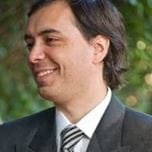
José Manuel Ureta
CEO
Marine Farm
“The Status Quo Theory of Depletion Does not Explain the Israeli Parole Decisions” is a project that Øystein started in graduate school at Stanford. Jonathan Levav, a professor at Stanford, had documented a bias in Israeli judges’ parole decisions: they were most lenient first thing in the morning, became less likely to grant parole over time, then became more lenient again after lunch and again became less likely to grant parole after that. This was explained in terms of a specific psychological theory of fatigue, which is that because people are assumed to have a limited stock of energy, deviating from the default (in this case, denying parole) is tiring and people are less likely to do tiring things when they are already tired.
Øystein recognized that there was an important prediction of this theory (which could distinguish it from other theories) in the data: after giving more paroles, a judge should be more tired and become less likely to give parole in the next case, on average. So, leniency should be affected not just by the time of day but also by the most recent decisions that a judge has made. Testing this is difficult, because the test needs to take into account that some judges are more lenient overall than others and that some judges’ leniency will change more over the course of a day than others. Using Levav’s data, he found that the theory did not explain judges’ behavior – they were not more lenient after granting parole than after not granting parole.
We also tested these ideas in a completely different context: people repeatedly making bids on foods that varied in healthiness and tastiness. We looked at whether exercising self-control (bidding more money for healthy foods than tasty foods) then results in less self-control later.
To do this, Øystein developed a mathematical model to precisely measure what was implied by the psychological theory. Again, we found that people’s behavior does change as they do more of a task (probably because they are getting tired), but not based on their prior decisions the way the theory had predicted.
Beyond understanding how decision-making changes as people get tired, this paper shows the benefits of using mathematical models to be precise about theories of behavior. The paper also illustrates how relying on simple analyses can result in mistakenly concluding that the data supports a theory even when it doesn’t, because the subtler consequences of the theory go untested without a formal model. Øystein’s hope was that this paper would inspire psychologists to be more precise in defining and testing their theories of repeated behavior over time.
Submitted by Oleg Urminsky